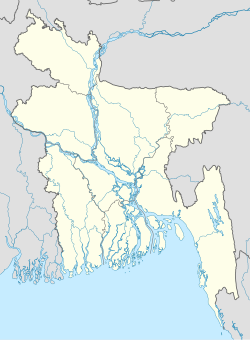Rangpur (city), Bangladesh
|
Rangpur রংপুর |
|
|---|---|
| Divisional Headquarters & City Corporation | |

Taj Hat er zamindar Bari
|
|
| Nickname(s): Green City | |
| Location in Bangladesh | |
| Coordinates: 25°34′N 89°15′E / 25.56°N 89.25°ECoordinates: 25°34′N 89°15′E / 25.56°N 89.25°E | |
| Country |
|
| Division | Rangpur Division |
| District | Rangpur District |
| Establishment | 16 December 1769 |
| Municipality | 1869 |
| City Corporation | 1 July 2012 |
| Government | |
| • Type | Mayor–Council |
| • Body | Rangpur City Corporation |
| • City Mayor | Sharfuddin Ahmed Jhantu |
| Area | |
| • Metro | 28 km2 (11 sq mi) |
| Elevation | 34 m (112 ft) |
| Population (2012 (est)) | |
| • Divisional Headquarters & City Corporation | 650,000 |
| • Density | 980/km2 (2,500/sq mi) |
| Time zone | BST (UTC+6) |
| Postal code | 5400 |
| National Calling Code | +880 |
| Calling Code | 521 |
| Website | rpcc |
Rangpur (Bengali: রংপুর) is one of the major cities in Bangladesh and Rangpur Division. Rangpur was declared a district headquarters on 16 December 1769, and established as a municipality in 1869, making it one of the oldest municipalities in Bangladesh. The municipal office building was erected in 1892 under the precedence Raja Janaki Ballav, Sen. Chairman of the municipality. During the period of 1890, "Shyama sundari khal" was excavated for improvement of the town. The Municipality is located in the north western part of Bangladesh. A Recently established public university of Bangladesh named "Begum Rokeya University, Rangpur" is situated in the southern part of the city. Previously, Rangpur was the headquarters of Greater Rangpur district. Later the Greater Rangpur district was broken down into the Rangpur, Kurigram, Nilphamari, Lalmonirhat and Gaibandha districts. In the great Rangpur region, little economic development took place until the 90s, mainly because of the yearly flooding the region used to see before the making of the Teesta Barrage. Coal is found near this district. There is a large military cantonment in the town.
Rangpur was conquered by the army of Raja Man Singh, a commander of the Mughal emperor, Akbar, in 1575, but it was not until 1686 that it was fully integrated into the Mughal Empire. Names of places like Mughalbasa (literal meaning being a locality of the Mughals), and Mughalhat (literal meaning a "local market" organised by the Mughals) bear testimony to the Mughal Association and past of Rangpur and its hinterland. Later on, Rangpur passed under the control of "Sarker" of Ghoraghat. During the period of the British East India Company, the Sannyasi Rebellion took place. Rangapur Ghoraghat has been mentioned in the Riyaz-us-Salatin. During the early period of the company rule fakir-sannyasi resistance and peasant rebellion were held in Rangpur.
...
Wikipedia

